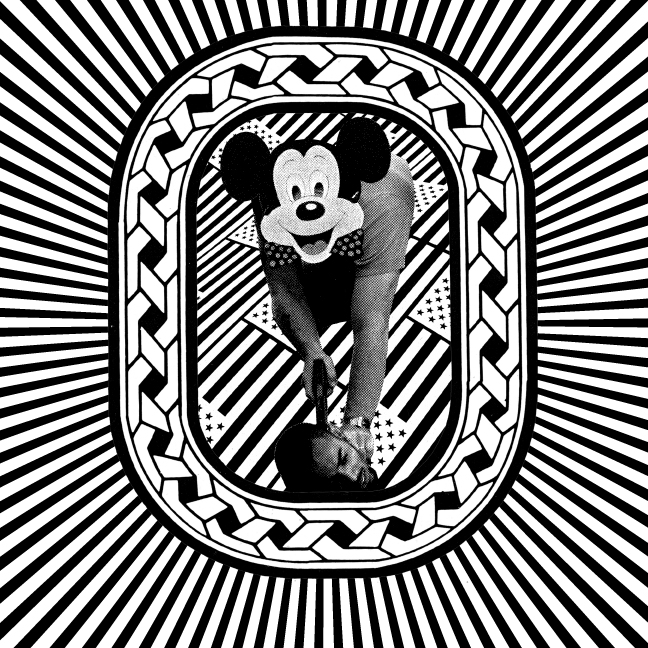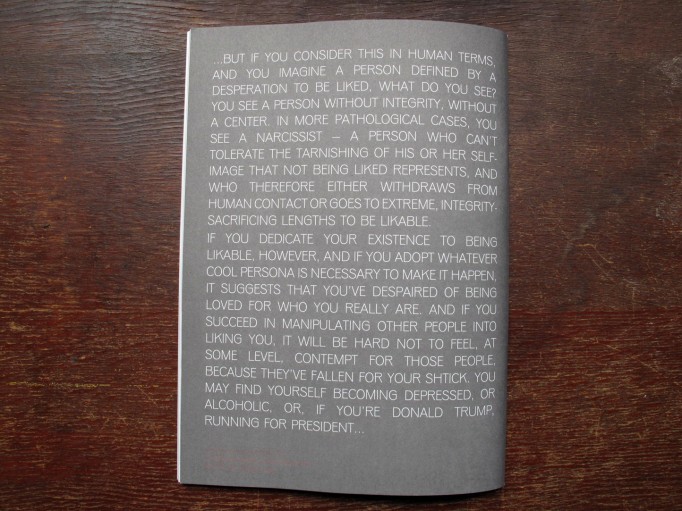Blech! Kitsch.
There was a great article posted on Print Magazine's IMPRINT blog yesterday about the toxicity of nostalgia in design. I couldn't agree more with what it represents and the warning that it should signal to designers everywhere. I discovered this quote in an article about Leni Riefenstahl's voyage to America in 1938 to find distributors in America for her film Olympia.
In 1939 Clement Greenberg, the American theorist of high modernism, defined kitsch as an antithesis, a "rear-guard" of the avant-garde. (Wood/Harrison, 529) In the grim ‘30s, the avant-garde fades, exiled, in hiding – in the "Totalitarian World", or stamped out by the dumb violence of economic facts – in the "Democratic World". It is occluded by its antithesis. For Greenberg, kitsch was both American commercial culture and the totalitarian art of Nazi Germany and the Soviet Union. Kitsch, the culture of the industrialized masses, explains Greenberg, exploits tradition. Kitsch is that which is recognizable. Kitsch is heightened reality that is made dramatic. (Wood/Harrison, 537) Kitsch bears traces of yesterday’s avant-garde, diluted. (Wood/Harrison, 534) In the Soviet Union this kitsch is represented by Socialist Realism, an idealized naturalism. In nazi Germany it is monumentalist art, again illusionistic and illusory. In America its quintessence is surely high-style Disney.We're suffering the same "dumb violence of economic facts" in this perpetuation of the 20th Century war-mindset. The century of the self continues to haunt us. Even in the virtual worlds we have created we find nostalgic monuments to memory "divorced from the experiences that generated them"(Angela Riechers). We must have the courage to lose the 20th Century in designing for today. Take the opportunity to create new models for the present, create online experiences which are not just platforms for consuming kitsch but in fact work to reduce or eradicate consumptive behavior. The internet is a global co-op. The internet can be used as a tool for global-local relations. The internet can be used as a way around corporations which because of their greed can only sell us our own oppression in a sameness that alienates and suppresses human potential.
So?
Diverge. Design new functions. Design for new functions. Design for gestures.
Maniacs of nothing
Death enters the universal even as it leaves the universal, and it is without anger.
Our aim is not to lend an ordinary revolutionary significance to such acts, and hardly to confer an exemplary category to them. Instead, we wish to understand the way they express fatality and to seize upon it so as to explore the depths of the Bloom. Whomever follows that view will see that the Bloom is NOTHING, but that this NOTHING is the nothing of sovereignty, the emptiness of pure power...
...That the men of this time equally participate in crime, is constituted without recourse by the Spectacle; it is the Spectacle that suggests this and regularly admits that the murderer was “an ordinary man”, “a student like any other”. But it refuses to recognize it as a metaphysical act: as the case of the operators of the Auschwitz gas chambers taught us, fear of responsibility is not only stronger than conscience, it is, in certain circumstances, stronger than the fear of death.
In a world of slaves without masters, in a world of collaborators, in a world dominated by a veritable tyranny of servitude, the simplest surrealist act is governed by none other than the ancient duty of tyrannicide. [Newer Bloom II]
Whomever is without community is sacer.
Shell
One answer that has come to dominate all others is that the future of activism is online. Dazzled by the promise of reaching a million people with a single click, social change has been turned over to a technocracy of programmers and “social media experts” who build glitzy, expensive websites and viral campaigns that amass millions of email addresses. Treating email addresses as equivalent to members, these organizations boast of their large size and downplay their small impact. It is all about quantity. To continue growing, they begin consulting with marketers who assure them that “best practices” dictate crafting a message that will appeal to the greatest number of people. Thus focus groups, A/B testing and membership surveys replace a strong philosophy, vision for radical change, and cadre of diehard supporters...
...Soon, the “click to sign” deception is rolled out and simply opening an email link is treated as signing a petition. And yet, while their membership list grows larger, the active portion of their base disappears. And what is worse, as well-meaning digital activists soon discover, they are being outdone by disingenuous advertising campaigns posing as true agents of change. [Rejecting Clicktivism, Micah White]
Ego issue
Believe in your fucking self.
Stay up all fucking night.
Work outside of your fucking habits.
Know when to fucking speak up.
Good things come to those who work their ass off and never give up.
Go and fucking find your inner demons.
Never give up or let someone else make decisions which are supposed to be yours.
If they don’t like you as the skinny girl you are, try to be a fucking plus-size.
If life gives you a lemon make sure there is tequila around.
If being number 14th in the world sucks work harder and become number one.
If you want to hide go and hide in a fucking smart way.
If you are going crazy.
Don’t worry.
Your mind is way too complex to keep it healthy.
If you don’t want to show your face show your feet.
Don’t fit in. Fit better.
They don’t believe in your idea?
Ignore it and take the challenge.
Take pictures of yourself no fucking matter how you look,
you are just doing it to prove you are alive anyway.
You are the result of 4 billion years of evolutionary success.
Fucking act like it.
It’s you. The next big thing.
I LOVE YOU. So go and fucking love yourself.
Lobby at 110 N. 5th Street
Sketches for a mural for the main floor lobby of 110 N. 5th Street. The building is located in a historic warehouse district once known for lumber, mercantile, and industrial fabrication. The forms are borrowed from that world and nuances of the surrounding city.
Withdrawl
[sketch] Withdrawl for The Rational Peasant, 2012 - Spraypaint on Battle Systems VS-17 marker pane, The Rational Peasant cut collage book cover, empty Zoloft bottle, magazine clip missing one bullet
THE YOUNG-GIRL SAYS YOLO
The Young-Girl prizes “sincerity,” “good-heartedness,” “kindness,” “simplicity,” “frankness,” “modesty,” and in general all of the virtues that, considered unilaterally, are synonymous with servitude. The Young-Girl lives in the illusion that liberty is found at the end of total submission to commodity “Advertising.” But at the end of this term of servitude there is nothing but old age and death.—Tiqqun
“LIBERTY DOESN’T EXIST,” SAYS THE YOUNG-GIRL, WALKING INTO THE DRUGSTORE.
The Young-Girl wants to be “independent,” which is to say, in her spirit, dependent only on THEM.
The Young-Girl is the central article of permissive consumption and commodity leisure.
In the Spectacle, access to liberty is nothing but access to marginal consumption of the desire marketplace, which constitutes its symbolic heart.
5 Acts of Money
One day she was invited to a literary gathering organized each week by a wealthy woman from Bogotá. She found the address up in the hills overlooking the city and entered an apartment big enough to house a theater. Of the forty or fifty women who had been invited to attend, she was the only one who did not yearn to meet a poet. Pierced and wounded by beauty, these millionairesses longed to know beauty, just as Psyche longed to know Cupid. An old man on a rostrum was reading aloud.
She thought about the aspirations that brought people to the world of plenty. In the past, indianos, the name given to Spaniards who returned home from the Americas having made their fortune, would grow palm trees in their gardens and have pineapples carved in the lintels of the doors to their houses, which they built with the millions they made selling slaves.
Once rich, the new millionaires set about stealing the beauty that belonged to others. What happened was more complicated than the attempts of new money to become old, or the bourgeoisie's desire to pass for aristocracy. Beauty, the attainment of metaphors, was the ambition of all money, new and old alike. Every millionaire was an arriviste. The gold he owned inevitably reminded him of that other gold, the gold above and the gold on the other side, the metaphorical gold that the Americas had been.
(Carolina Sanín - Five Acts of Money)
Makers As Escapists
“Would it be fair to see this as an escape plan: a possible solution for
any captive maker? Escapism is often used to describe cowardice. As
discussed earlier, everyday life activities – not those associated with
work but those Bob Black would call playful practices – can become very
lucrative for industries that take them to extreme levels. This market
exists because of the tendency of human beings to distract themselves in
reaction to the heaviness of working life. To some, escapism is
associated with the inability or unwillingness to connect meaningfully
to the world.” (Excerpt from Makers As Escapists)
Hence the aggregated image feed.
Hence the aggregated image feed.
+1 Olympics
Yes, BUILD were technically off-brief since the brief called for ONLY positive responses. Who's to argue with that? Or rather, how can one argue with that? However what I think BUILD brought to them is entirely appropriate and effective.That the brief is so narrow in scope is what's truly wrong and BUILD's complicit acknowledgement that the posters were "too cynical" complicates the problem further. BUILD are self-censoring by implying the message they have constructed should be overlooked and dismissed when in the context of a global awakening, widening economic disparity, and Occupy encampments screaming out against the corporate coup, these messages are ever more relevant. Still, the arrangement of corporate logos replacing the Olympic rings aren't that incriminating. Certainly not when compared to the slew of BP Oil spill parodies that have surfaced.
This subject brings me back to a post I made a month or so back about the shift in communication design from the spectacle of right vs. wrong to a focus on the interesting and relevant. Self-censorship and extreme anti-bullying measures are in many ways setting us up for a very one-dimensional conversation. That you cannot criticize, much less draw attention to, the Olympic Games or Gay Pride events being compromised by corporate interests is a dangerous precedent to set.
Subscribe to:
Comments (Atom)

































